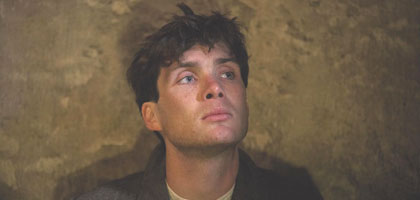Primary navigation


Ken Loach's Palme d'Or winner unravels the complex struggle to oust the British from Ireland after the 1916 uprising. But does its austere integrity do justice to the cause, asks Edward Lawrenson
Over the course of his 40-year career Ken Loach has been unusually adept at making films that enlarge and contest our understanding of the big issues of the day. From challenging alleged aspects of UK government policy, as in Hidden Agenda (1990), to pointing up class inequalities through dramas about low-income Britain, such as Sweet Sixteen (2002), his films have the persuasive force of crusading journalism. That he also brings to each project a masterly economy of style, a stirring dramatic urgency and a gift for bold strokes of raw emotion (a mix unmatched in British cinema) is overlooked by those who dismiss his work as 'mere' polemic.
But in The Wind That Shakes The Barley Loach's touch as political essayist and dramatist is less certain. Set during the 1920 guerrilla war waged by republican volunteers to oust the armed forces deployed by the British to resist Irish independence, it covers some of the causes of Ireland's still-troubled relations with the UK and the ongoing conflict in Ulster. Revolving around Damien, a young doctor who abandons his plans to train in London in order to fight in the armed struggle alongside his brother Teddy, the film carries an inevitable frisson of controversy, at least for those viewers in the UK who prefer not to be reminded of their country's colonial brutalities.
The Wind That Shakes The Barley rightly doesn't spare us. Its opening sequence features British soldiers beating to death a young Irish farmworker for refusing to identify himself, and the violence of the occupiers is convincingly immediate throughout. In a scene of gruelling claustrophobia, Teddy has his fingernails pulled off in a British military prison. Later some Black and Tans, the mercenaries paid to suppress the separation movement, violently abuse Damien's sweetheart Sinead; the scene is all the more disturbing for being observed, at a distance, by Damien and his comrades.
With the director having previously catalogued crimes committed against freedom fighters in Carla's Song (1996) and Land and Freedom (1995), there's a battle-worn matter-of-factness to Loach's depiction of colonial oppression here. Once again he finds moments of reflection in idyllic pastoral interludes. From the woodland meeting place of Damien and Sinead, their path edged by a green blaze of ferns, to the wind-whispered hills of the volunteers' training ground, director of photography Barry Ackroyd captures the beauty of a landscape that seems to confer a stilled dignity to the nationalist struggle.
This is a handsomely mounted case for the republican cause, but the portrayal of the internecine fighting within the movement as it enters talks with the British is less sure-footed. Played with piercing conviction and reedy charisma by Cillian Murphy, Damien is the defender of the progressive ideals of James Connolly, one of the leaders of the 1916 uprising, while Teddy favours the opportunity for limited statehood that the 1921 Anglo-Irish Treaty offers. The stage is thus set for a lengthy discussion of the merits of the treaty and the consequences of abandoning the socialist tenets of republicanism that recalls the extended debates of Land and Freedom. But whereas Loach's Spanish civil war drama had an absorbing roughness, the equivalent scenes here are dry and sloganeering. "All we're changing is the accents of the powerful and the colour of the flag," hardly rolls off the tongue, even when delivered by the compelling Murphy.
In another echo with Land and Freedom, Damien's passionate commitment is crushed by the interests of a settled elite: an early rift develops between Damien, who wants to punish a local businessman for exploiting an impoverished tenant, and Teddy, who depends on the man's wealth for arms. But the elegiac tone of Land and Freedom is replaced with a sour nostalgia for a moment when opportunities for change were fleetingly realised before being irrevocably lost.
Loach's standpoint will be applauded by some as flinty integrity, but it also plays as a grouchy fundamentalism in which all but the most stalwart defenders of Connolly's ideals are demonised. Towards the end of the film he cuts from the defeated Black and Tans marching out of town to a column of uniformed, self-important Free Staters led by Teddy. The implication is that the former freedom fighters have become what they once resisted. But is this fair? Teddy's pro-treaty beliefs make him a tragic hero in the truest sense: few crimes are as unforgivingly Sophoclean as fratricide. But there is nothing in the film to suggest that he and his men are capable of the calculated butchery of the Black and Tans. Loach has said that he wants the film to help us to understand the ongoing problems in Northern Ireland. But is his implication that any deviation from Damien's principles is perfidy and his distaste for the very idea of compromise appropriate in these post-Good Friday Agreement times?
Even if it were historically supportable, that edit between the Black and Tans and the Free Staters is a clumsy piece of rhetoric. The lack of elegance is not unique. Loach's naturalistic style has often disguised melodramatic plotting, but writer Paul Laverty's schematic simplicities are starkly revealed in this film. The farmhouse in which the murder of the local boy that opens the film takes place is the site of two other acts of violence: one physical, when the Black and Tans assault Sinead; one psychological, when Teddy arrives to announce that Damien has been executed. The linking of repeated instances of state-sanctioned terror to the same location may, on paper, suggest the tragic circularity of Irish history, but it comes across on screen as an implausible and heavy-handed bit of symbolism.
This coarsening of Loach's artistry is most evident in the director's depiction of the English and Scottish soldiers as either pantomime toffs or brutish squaddies. Loach is hardly breaking news when he suggests the British acted with appalling violence in Ireland, but by robbing the soldiers of any glint of humanity he misses an opportunity to probe the ethical dilemma Damien himself suffers before joining the armed struggle. After staging a roadside attack, republican guerrillas are ordered not to look at the bodies of the mercenaries killed (presumably to avoid humanising their enemy). It's an order Loach's camera operator also obeys, but the refusal to confront the bloody consequences of the volunteers' decision to meet British savagery in kind sells short Damien's sense of sacrifice: after five years' study he is called upon to kill, not to heal. With Teddy ultimately vilified as much as the one-dimensional Brits, the film's sympathy finally narrows to the lone defiance of Damien in his dingy cell, suggesting that Loach's concern is not with the knotty dynamics of collective struggle but the tragic intransigence of individual martyrdom.
In the masterly first episode of Days of Hope, Loach's 1975 TV mini-series about the labour movement in Britain in the 1910s and 1920s, rowdy British troops sent to Ireland to suppress the 1916 uprising bully a farmer's daughter into singing a traditional Irish song. The braying squaddies are silenced by the beauty and conviction of the girl's performance in a delicately played moment that illustrates the potential political significance of art and its capacity to change behaviour. There's also a folk song in The Wind That Shakes The Barley, when Teddy screams while being tortured and his cellmates sing to block out the noise. It's an example of art put to an altogether cruder political purpose, and its note of despair echoes throughout the film.
The champions of progressive politics in this movie are allowed even less time to make their case than their equivalents in Land and Freedom. Teddy's accommodation with the ruling elite is viewed as an act of blood-stained betrayal and Damien's socialist beliefs lead him to the firing squad. Approaching his seventies, Loach has made a film of uncompromising, wintry bleakness, haunted by death and ravaged ideals. The days of hope have never been shorter.